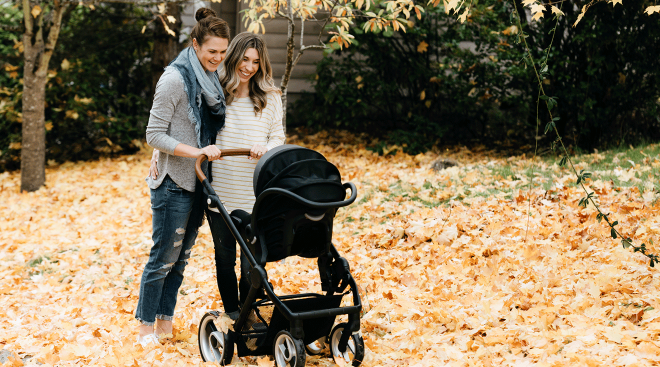- Your uterus is expanding big time—meaning that bump might show up any day now (if it hasn’t already!).
- Some pregnant people can feel baby move as early as 16 weeks. If this isn’t your first pregnancy, you’ll easily recognize (and more readily identify) those signature kicks, jabs and rolls. FYI, early movement is called quickening.
- Amniocentesis is an elective test that happens between 15 and 20 weeks gestation. It can diagnose neural tube defects, chromosomal abnormalities and other genetic disorders. It’s generally considered safe, but comes with a very small increased risk of miscarriage.
Now that you’re 16 weeks pregnant, things are getting pretty exciting. You may have another prenatal visit this week, where you will get to hear baby’s heartbeat again. Even more thrilling will be feeling baby kick, which could happen starting this week, so pay attention to those subtle feelings in your 16 weeks pregnant belly. Another cool fact? Baby is starting to be able to hear your voice—and they’ll recognize it at birth—so feel free to chat baby up any chance you get.
One of the most exciting things happening with baby involves their physical coordination. They can finally hold their head up straight, and even though you can’t feel them moving just yet, they’re definitely testing out what they can do with their arms and legs. Their facial development is improving too: their eyes and ears are moving closer to their permanent spots, and they can squint, frown and make other expressions (basically, they’re ready for their close up!).
Inside your 16 weeks pregnant belly, baby is listening to your voice, thanks to tiny bones forming in their ears. Your 16-week fetus is growing hair, lashes and eyebrows, and more of their taste buds are forming.
What else is baby doing at 16 weeks? Growing! Baby develops a lot during the second trimester, and a 16-week fetus is no exception. Lots of sophisticated organ development is happening right now. Though baby started making urine and blood weeks ago, both are beginning to flow more steadily in baby’s body as their urinary and circulatory functions improve. Their liver and pancreas are producing secretions, their bones are beginning to harden, more lung tissue forms and even toenails appear. In short, it’s a big week for baby!
How big is baby at 16 weeks pregnant?
At 16 weeks pregnant, baby is the size of an avocado, measuring between 4.6 to 5.5 inches long and weighing between 2.5 to 3.5 ounces.
16 weeks pregnant is how many months?
Sixteen weeks pregnant is four months pregnant—but remember, most doctors track your progress by week, not month.
16 week ultrasound
You’ll probably have a four-month prenatal visit around the time you’re 16 weeks pregnant. As usual, you’ll likely have a urine test; your OB will be checking your urine for signs of gestational diabetes and preeclampsia. You may also have a 16 weeks pregnant ultrasound at your appointment, but don’t be alarmed if you don’t, as your OB will do one closer to mid-pregnancy.
More reason to celebrate: There are some 16 weeks pregnant symptoms that are actually good. For example, some moms-to-be find their hair and nails grow faster. Your hair might actually look thicker and more lustrous and your skin might look radiant, too. Woohoo! Here’s more of what you might be feeling at 16 weeks pregnant:
Backaches
Your aching back is a side effect of pregnancy hormones and posture changes that happen as a result of your growing bump. To ease backaches, make some time for low-impact exercise. Sit and stand up straight and regularly stretch your body.
Bigger boobs
Your breasts may have gone up one or two cup sizes by now and should be completely prepped for breastfeeding by the end of the second trimester.
Constipation
Getting, um, stopped up is an unfortunate result of your uterus starting to press on your intestines and the surge in pregnancy hormones. Load up on fiber-rich foods and drink lots of water to keep things moving.
Forgetfulness
This is also known as #PregnancyBrain. No one knows for sure what causes pregnant women to become more forgetful. It could be biological or it could just be a result of having lots on your mind!
Dry, itchy, sensitive eyes
Blame the hormones once again! Some moms-to-be find themselves dealing with dry and itchy, watery eyes, especially if they have allergies. You could try over-the-counter allergy medications or eye drops for dry eyes, but be sure to consult your OB before choosing one.
Glowing skin
Finally—that pregnancy glow that people are always talking about. Va va voom! Keep your skin looking its best by knowing what topical products to use—and what ingredients to avoid, like Retin-A containing products.
What should you feel at 16 weeks pregnant?
As the second trimester continues, you should be gaining more energy. Many moms-to-be enjoy glowing skin, thanks to a combination of more blood pumping through your body and hormones increasing oil production in the skin. On the flip side, you may still experience symptoms you’ve been dealing with for weeks now. Bleeding gums, leg cramps, aches and pains, skin discoloration and swelling are all common occurrences for women who are around four months pregnant.
If you’re 16 weeks pregnant with twins, your symptoms probably won’t be different than they would be for a mom carrying one baby at this point. You definitely want to keep your doctor posted on all your symptoms, though, since a twin pregnancy is considered higher risk, so your doctor will want to keep close tabs on you and your babies.
Pretty soon, you’ll start feeling baby moving around in your 16 weeks pregnant belly. At first, those moves might feel like gas or a muscle twitch, but over time, as baby gets bigger and stronger, they’ll be unmistakable. If you’re 16 weeks pregnant with twins, you won’t feel kicks any earlier than a singleton mom-to-be will, but over time, twin moms definitely feel more kicking sensations.
Of course, feeling those movements comes with other issues, like having your lungs crowded by your growing babe. That could make it seem tough to catch your breath from time to time.
Should you have a baby bump at 16 weeks?
Your bump is probably making its appearance around 16 weeks pregnant, if it hasn’t popped already. There are a few different reasons behind the size of your 16 weeks pregnant belly, which include your expanding uterus and possible bloating from excess fluid in the body. And of course, your growing baby is taking up space too!
Nothing sweeter than week 16. Around now is when that first trimester nausea has likely subsided. You may also be feeling more energetic than in the first trimester, but make sure you take it easy and get plenty of rest so you can continue to exude that beautiful pregnancy glow.
Here are some things to do this week.
Prevent acne breakouts
The extra oil your skin produces during pregnancy can lead to pimples, so control flare-ups with oil-free products that do the job while still being gentle enough for you and baby. Look for cleansers and treatment products with glycolic acid, benzoyl peroxide or azelaic acid and avoid retinols, but always consult with your doctor before using an acne treatment.
Make lists
Pregnancy brain can be frustrating, so get ahead of it by making to-do lists. Whether you have a digital planner or use old-fashioned paper and pen, jotting down all you have to do—and it’s probably a lot right now!—helps you keep track of everything without missing a step.
Update your bra drawer
By now your breasts have probably grown quite a bit, and suddenly the bra spillage is real. Skip the sexy lingerie section and invest in some high-quality maternity or nursing bras to best support the girls.
Find a chair with good support
If you’re working through your pregnancy sitting at a desk, it can intensify any backaches you have. Try placing a support pillow behind your lower back, or find a comfortable ergonomic chair that keeps your back straight, not hunched over.
Frequently Asked Questions
Why am I feeling so constipated?
Pregnancy constipation is an all-too-common symptom throughout the three trimesters of pregnancy. It’s caused by a combination of factors: high progesterone levels that slow down gut motility, lower activity levels, prenatal vitamins (containing iron) and your growing uterus, which can crowd your other internal organs and decrease their functioning.
You probably don’t need to worry about pregnancy constipation—it isn’t dangerous—but it can certainly cause discomfort and other problems like hemorrhoids and anal fissures. If lifestyle changes and pregnancy-safe treatments like stool softeners aren’t helping or you’re having any rectal bleeding, contact your provider.
How can I prevent stretch marks during pregnancy?
Sometimes, there’s not much you can do to prevent stretch marks; you’re more likely to get them if they’re in your family history. Moreover, they may be more noticeable in people with darker skin. Rapid stretching of the skin is a risk factor, too (and you can’t really control the growth of your abdomen during pregnancy!).
But the best way to prevent stretch marks during pregnancy is to take good care of your skin: keep it well-hydrated by drinking plenty of water and eating a nutrient-rich diet, moisturize regularly and promote its elasticity with a product made with cocoa butter and exercise to foster the production of collagen, which makes skin stronger.
Is sex during pregnancy safe?
As long as you’re having a healthy, uncomplicated pregnancy, sex is perfectly safe! Don’t worry, you can’t hurt baby and they’ll have no clue what’s happening. Moreover, sex can play an important role in maintaining the intimate bond between you and your partner during pregnancy.
There are times when it may not be safe to have sex during pregnancy, including if you’re having multiples, have placenta previa or are at risk for preterm labor. If you have any pregnancy complications, make sure you ask your provider about sex during pregnancy.
Why am I having such vivid dreams in pregnancy?
It’s not your imagination: your dreams really have gone off the rails during pregnancy! Research has shown that vivid dreams during pregnancy are caused by a combination of fluctuating hormones- (including high levels of progesterone) and heightened emotions (like all that anxiety you’re having about your mother-in-law asking if she can be in the delivery room while you’re in labor).
You also may not be sleeping that well thanks to all those physical discomforts, like an aching back, morning sickness and leg cramps. Poor sleep can cause an increase in intense dreams too.
There's no turning back, but I definitely had moments of "what have we done?!" I was so excited to become a parent, but also felt so nervous about how things were going to change. It's hard to admit, but I wasn't 100 percent confident we were ready. But the moment baby arrived, all doubt flew out the window. Ready our not, our new life was heaving on my chest, and I knew we'd figure it out.
Please note: The Bump and the materials and information it contains are not intended to, and do not constitute, medical or other health advice or diagnosis and should not be used as such. You should always consult with a qualified physician or health professional about your specific circumstances.
Johns Hopkins Medicine, The Second Trimester
Cleveland Clinic, Quickening in Pregnancy, April 2022
American Pregnancy Association, Amniocentesis
Johns Hopkins Medical Education Division, Fetal Heartbeat, 2005
Newborn and Infant Nursing Reviews, Auditory Development in the Fetus and Infant, December 2008
Yale Baby School, Does My Infant Recognize Me?
Cleveland Clinic, Pregnancy: Second Trimester, November 2021
Handbook of Clinical Neurology, Anatomy and Development of the Human Taste System, October 2019
Cleveland Clinic, Fetal Development, March 2021
American College of Obstetricians and Gynecologists, How Your Fetus Grows During Pregnancy, December 2021
MedlinePlus, Fetal Development, July 2021
National Library of Medicine, Embryology, Pulmonary, August 2023
Mayo Clinic, Pregnancy Week by Week, June 2022
Michigan State Department of Health and Human Services, Fetal Development: Week 16
American Pregnancy Association, 16 Weeks Pregnant
Mount Sinai, Prenatal Care in Your Second Trimester
Stanford Medicine Children’s Health, Pregnancy and Skin Changes
American College of Obstetricians and Gynecologists, Skin Conditions During Pregnancy, December 2021
American Pregnancy Association, Pregnancy Glow
Johns Hopkins Medicine, Back Pain in Pregnancy
American Pregnancy Association, Breast Changes During Pregnancy
Cleveland Clinic, Lactation, December 2021
Cleveland Clinic, Pregnancy Constipation, October 2021
Psychoneuroendocrinology, Working Memory from Pregnancy to Postpartum: Do Women Really Change?, April 2021
Scientific Reports, The Effect of Pregnancy on Maternal Cognition, June 2021
Turkish Journal of Ophthalmology, Pregnancy and the Eye, October 2015
American College of Allergy, Asthma & Immunology, Pregnancy and Allergy, April 2018
March of Dimes, Isotretinoin and Other Retinoids During Pregnancy, June 2019
American Pregnancy Association, Lack of Energy During Pregnancy
Cleveland Clinic, Pregnancy Gingivitis, March 2022
U.S. Department of Health & Human Services Office on Women’s Health, Body Changes and Discomforts, February 2021
American Pregnancy Association, Skin Changes During Pregnancy
American Pregnancy Association, Swelling During Pregnancy
UCSF Health, High-Risk Pregnancy
Harvard Health Publishing, Shortness of Breath in Pregnancy
Akron Children’s Hospital, Pregnancy Brain: Is That a Real Thing?, June 2022
Cleveland Clinic, Your Guide to Healthy Pregnancy, 12th Edition, 2023
Cleveland Clinic, Pregnancy: Correct Posture & Body Mechanics, January 2018
Canadian Family Physician, Treating constipation during pregnancy, August 2012
American Pregnancy Association, What Can Be Done To Prevent Stretch Marks?
March of Dimes, Sex During Pregnancy
American Pregnancy Association, Pregnancy Dreams
Mayo Clinic, Fetal Development: The 2nd Trimester, June 2022
Nemours Kids’ Health, Week 16
American College of Obstetricians and Gynecologists (ACOG), How Your Fetus Grows During Pregnancy, January 2024
American Pregnancy Association, 16 Weeks Pregnant
Medline Plus, Fetal Development
Learn how we ensure the accuracy of our content through our editorial and medical review process.
Navigate forward to interact with the calendar and select a date. Press the question mark key to get the keyboard shortcuts for changing dates.
Advertisement
Advertisement
Advertisement
Advertisement
Advertisement
Advertisement
















































